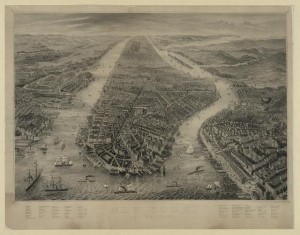New York City: a Bulletin Board Reader “Read Himself Hoarse”
From The New-York Times April 13, 1861 (The New York Times Archive):
THE NEWS IN NEW-YORK.
Yesterday was a day of excitements. Rumors apparently well grounded concerning the progress of affairs at Charleston flitted through Wall-street, pervaded the thoroughfares and produced sensations of surprise, indignation and rejoicings, according to the nature of the mind to which they were brought. …
At 5 o’clock in the afternoon, however, all uncertainty was set at rest. The telegraphic wire brought the long looked-for intelligence that WAR HAS BEGUN, and that the forces of the Confederated Traitors have struck the first blow. Expected as was the news, it produced a most remarkable and wide-spread sensation. Many had hoped the contest might yet be avoided others thought the Federal Government would back down rather than shed blood; and others were certain that a Divine Providence would interfere to prevent so fratricidal a strife. The bulletin boards were surrounded; the streets near them were blockaded, and the fast-gathering multitude were only satisfied when the self-appointed reader had read himself hoarse in the frequent repetition of the brief announcement of the facts. Hundreds of anxious inquirers besieged the telegraph and publication offices, confident that there might yet be some item of information which was withheld from the masses, and they were only appeased when told that they were in possession of all, and that until this morning’s papers were cut they could have no more.
“Good, good,” exclaimed many a one, as he read the statement, or as it was repeated to him by a friend, “at last we have reached a crisis; something must be done.” The feeling of rejoicing was everywhere to be met, that Major ANDERSON had not lowered his flag, and that President LINCOLN had determined to sustain, even at so fearful a cost, the honor of the country. Of the very many with whom we conversed, and from whom we heard the freeset expression of opinions, we did not find a single individual who did not respond heartily to the sentiment, “Thank Heaven we have a Government.” Speculations and wagers of all kinds were the order of the night, as to the probable effect of this or that battery, of the arrival and probable action of the fleet, and of the result of this first contest; and very long odds were offered and taken that Sumpter would silence Moultrie, and that the fleet, on arrival, would find but little to do. However that may be, the war has begun — the aggressors were the Confederated forces, the Federal post has returned vigorously the fire, and the entire moral support of the North stands about the President in this trying moment, as will the entire physical force stand at his side if a more trying hour should come.
There is so much going on 150 years ago this week I might jump around on the dates. I liked this story because it reminded me of how hungry people seemed to be for the news of Lincoln’s Inauguration. I never realized there were apparently bulletin boards set up throughout cities to publish snippets from the telegraph.
Seven Score and Ten has published an editorial by a Richmond newspaper that sees the Confederate attack of Fort Sumter as the North’s fault. To read a Northern view of the attack check out The New York Times Archive.

